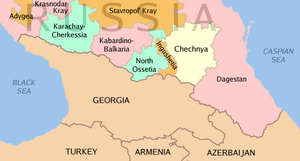Chechen/Introduction
![]() Chechen — Содержани | Чудигар | Нохчийн абат | 01 | 02 | 03 | Талламанболх 1 | 04 | Хаархаттар
Chechen — Содержани | Чудигар | Нохчийн абат | 01 | 02 | 03 | Талламанболх 1 | 04 | Хаархаттар
Чудигар
Introduction
Welcome to the world of Wikibooks' language guide to learning the Chechen language. You are here either because you have an interest in learning this wonderful ancient and modern language, you are either Chechen or have Chechen blood, you have a passion for Chechnya and/or languages, you are planning to travel to Chechnya, you have Chechen friends and would like to speak to them in their mother tongue, you want to understand Chechen music and culture, or you just want to learn Chechen for the fun of learning a language and just interested. Whatever the reason, you are here because you want to learn Chechen and we are here to help.

Chechen is a Northern Caucasian language language of the Nakh family. It is the mother tongue of over 1.3 million people all over the world. It is also the vernacular language of the Republic of Chechnya, located in Southwest Russia in the Caucasus and north of Azerbaijan and Georgia. Chechen is a rather old language, and first was written in the Arabic alphabet. It was then written in the Latin alphabet right after the Soviet Union formed. Since 1938, Chechen has been standardised in the Cyrillic alphabet, though some Chechens prefer to write in the Latin alphabet. This book will teach Chechen in the standardised Cyrillic alphabet.
You probably have never heard any language remotely close to Chechen. The closest language to Chechen, and mutually understandable, is Ingush. Another language similar to Chechen is Avar. Chechen is a language composed of strong consonant sounds with a tendency to skip and ignore vowel sounds. (Although, the vowel harmony is somewhat similar to that of Finnish or Turkish). There are many unusual sounds that a speaker of any Indo-European language might be unfamiliar with, or even be taunted by. There are also many influences from Arabic, giving sounds that have an equal counterpart in Arabic (such as хь and ح).
The grammar in Chechen is also really challenging. The verbs do not conjugate like most European languages do. Instead, verbs conjugate according to class and number. The class is a fundamental part of Chechen grammar. This is composed of four different sounds and letters, but we will cover all of this in this book. Do not be turned off by the challenges that await you, just remember that every language is complex, and that when you accomplish the goal of obtaining language knowledge, especially that of Chechen, the feeling is overwhelming.
Read more about the Chechen language
How to use this book
editThis book is a free content open source guide in learning the Chechen language. Though it can be edited by anyone, it is also being monitored by the authors and administrators of this book and Wikibooks to strive for 100% accuracy and verification. Do not be discouraged if you want to use this as your primary or even secondary resource in your studies of the Chechen language.
The book is set up in step-by-step lessons which will introduce the language like a classroom setting and similar to a textbook style tutorial. It will commence with the basics of the language, and gradually introduce grammar aspects of the language, rather than give you a bunch of grammar explanations and a massive list of vocabulary to learn on your own. The book is set up accordingly so you can go at your own pace whether you are a fast learner or prefer to take your time.
Use the navigation header above to navigate to the next lesson, a previous lesson, or the pronunciation guide. Also at the top will be audio files for you to use at your discretion. These are very useful if you want to get a hold on hearing and speaking the language, rather than just learning how to read and write.
At the end of each lesson will be small little practise exercises to test yourself on the knowledge you've gain and accumulated in the previous lessons. Do not be tempted to skip over them! It is very easy to just say Oh! I have done enough, I know the answers, no problem at all. Try to work on each question and check yourself. This will only improve your knowledge of the language.
Learning a language is a tough challenge, but with this book, we will try to make it as informative, fun, and motivative as possible to help you learn the Chechen language. A good way to practise is reading the Chechen Wikipedia! Listen to Chechen radio too at Chechenyafree.ru live. You can also listen to daily broadcasts from Radio Free Europe North Caucasus. Аьтто хилла иншАлла!
Chechen — Содержани | Чудигар | Нохчийн абат | 01 | 02 | 03 | Талламанболх 1 | 04 | Хаархаттар